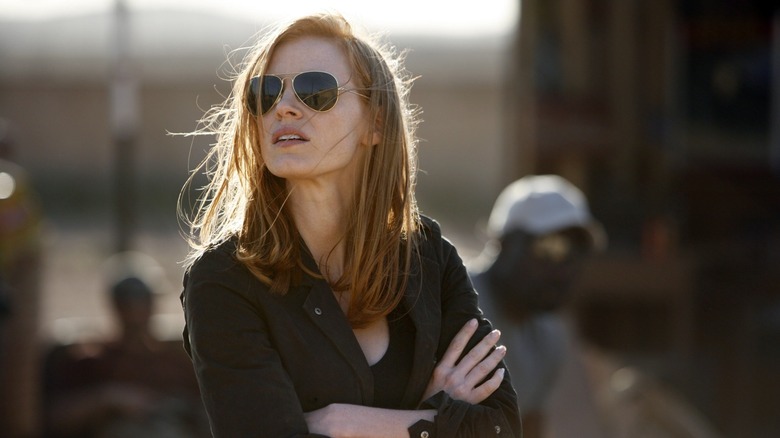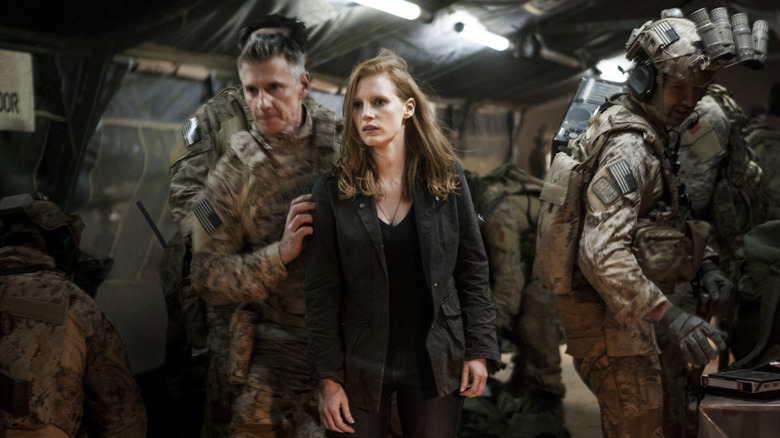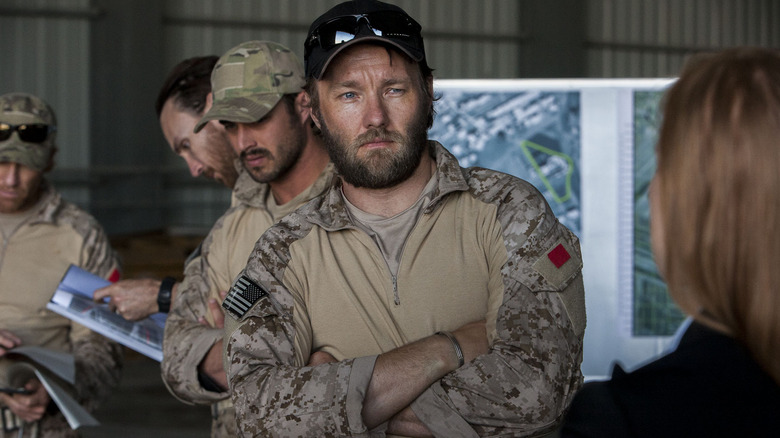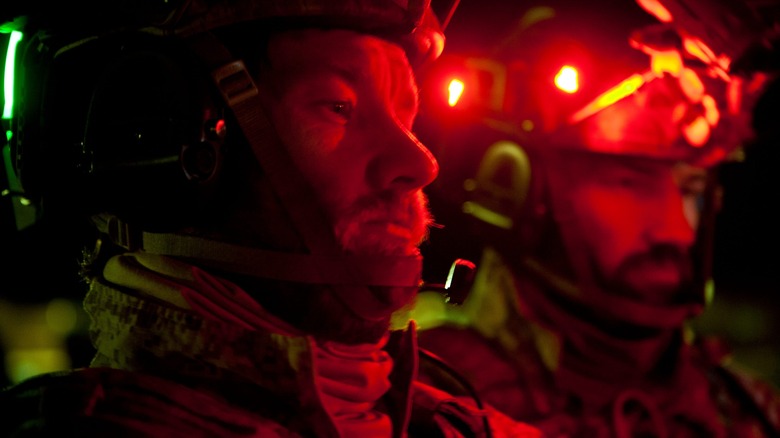
Kathryn Bigelow's 2012 film "Zero Dark Thirty," which starred Jessica Chastain as CIA analyst Maya Harris and depicted the hunt for al-Qaeda leader Osama bin Laden, was nominated in a handful of categories at the 2013 Academy Awards and went home with an Oscar for best sound editing. However, it's most remembered for the controversies that surrounded it.
When the United States became involvement in Iraq, Afghanistan, and began the general War on Terror during George W. Bush administration, many curious things happened to popular culture. Some artists and audiences who opposed the military actions looked back to protest songs of the Vietnam War, or to the punk backlash against Ronald Reagan, and took a deep sigh and repeated the mantra, "At least we'll get some good art out of this."
This is a phrase often heard in times of political upheaval. As citizens, we may have lost power of a brazenly corrupt government, or a violent and frustratingly automated military machine that is spinning into torture and lies, but we do -- at the very least -- have control over how we talk about it and criticize it in out art. Surely this would be a time of angry pop music opposing the famously messy and subterfuge-infused military actions in the Middle East.
And while there was protest music during this era, the pop landscape was more often lifting up angry revenge ballads (look up the lyrics to Toby Keith's hit song "Courtesy of the Red, White, and Blue (The Angry American)") and making movies about how this was just "a confusing time." It wouldn't be for a while that we learned the full extent of the lies and horrors involved in the war, something we're still sifting through.
It would take years before our views on this era would be clear, and "Zero Dark Thirty," while highly awarded, was not welcomed with open arms by audiences, due to its views that appeared to advocate torture.
The Simple Narrative

"Zero Dark Thirty" was immediately a lightning rod for controversy, inspiring a litany of examinations from critics and editorialists as to its accuracy, and, more importantly, its attitude about the war. The film was made, after all, during the Obama administration which oversaw the May 2nd, 2011 Abbottabad raid that killed Osama bin Laden. For many, this was the end of the conflict. A simple narrative formed: A bad man attacked America, we used some dodgy means of finding him, but find him we did, and he was executed by our military. Going back and delving into those dodgy means was not something everyone was so interested in, and the Toby Keiths of the world were validated.
During the length of the conflict, however, one might have noticed more and more images of torture leaking into popular entertainment, to the point where it was almost normalized. Hit shows like "24" (which debuted in November of 2001) regularly argued that torture was a swift and efficient way to obtain information. In 2004, the torture pictures from Abu Ghraib were released to the public, and it's a timely coincidence that the "Saw" film series began only a few months later. The bulk of the 2000s was inundated with a new horror genre, nicknamed torture porn, and images and conversations about the manner and ubiquity of torture proliferated through our cynical, tired-out minds, leaving a sticky residue of outrage and resentment.
This normalization of torture images was tolerated for two reasons: One, seeing in a horror context it helped to remind us that we, as a nation, were involved in something shocking and that it shouldn't become easy-to-consume action movie fodder. And two, many Americans felt this was the Only Way to get what we needed. It was sold as a dark necessity, and popular entertainments were serving as an apology for the nation's latest sine qua non.
Was It An Apology?

Enter "Zero Dark Thirty" a film that openly featured scenes of torture. I think we're all sophisticated enough to understand the basic film tenet that depiction does not equal advocacy, but many felt that depicting torture at all in a based-on-real-events military thriller was tacky at best and irresponsible at worst. Naomi Wolf, in The Guardian, wrote an open letter to Bigelow pointing out that her depiction of torture without criticism or context turned her into a propagandist for the military state, and even going so far as to compare Bigelow to Nazi propagandist Leni Riefenstahl: "It makes heroes and heroines out of people who committed violent crimes against other people based on their race -- something that has historical precedent."
Kathryn Bigelow defended herself during the controversy by describing herself as a combination filmmaker and journalist. It was her goal, she said, to merely record what happened as it happened, without judgment. Even if it was a fictionalized narrative, and the perspective was mostly from the character of Maya Harris. She wasn't apologizing or advocating for torture. But it did happen and she was, as she explained, merely relating the truth.
That narrative, by the way, moved the story of "Zaro Dark Thirty" from one of the CIA or one of the military to that of a single, doggedly determined CIA agent. Maya is given typically zealous, violent language like "I'm gonna kill bin Laden!" and the film becomes a cycle of torture to get information, that information not coming quite quickly enough, another terrorist attack, hasty arrests, more torture, etc. The film essentially becomes -- broadly speaking -- a race for Maya to find torture-based information quickly enough to find Osama bin Laden. She may be seen as an avatar for the CIA in general ... but not really. "Zero Dark Thirty" was seen as a way to deflect the real-life military violence of the United States onto a figurehead for American frustrations. In making the film about her own personal vendetta and her frustration in not getting revenge fast enough ... well, that sort of ties into justifying America's own bloodlust and willingness to forgive torture as a means to achieve it, doesn't it?
Was The CIA Involved?

But the controversy went deeper than film theory and depiction vs. advocacy. Yes, as it turns out, the CIA was involved in the making of "Zero Dark Thirty."
As detailed in an article on The Ringer: Thanks to a conservative group called Judicial Watch, e-mails between the White House and the Pentagon were eventually uncovered, revealing their involvement in this film. It's worth stating at this juncture that any and all films that depict the military are typically made with the military's involvement (often in order to gain access to vehicles, uniforms, etc.), so some military involvement in a film like "Zero Dark Thirty" is typical and expected. What is not expected is that the CIA was also involved, aiding Bigelow and screenwriter Mark Boal in the construction of the film. No, the CIA wasn't offering screenplay notes, but Boal and Bigelow were relying on the CIA's version of events -- and perhaps general attitudes they dictated -- to make "Zero Dark Thirty." This means that Bigelow wasn't constructing a narrative based on her point of view, but was making a movie specifically to advance the CIA's point of view -- a point of view that, we now know, was riddled with lies and obfuscation.
Bigelow, in trying to remain objective, may have been wittingly or unwittingly pushing actual CIA propaganda. For as thrilling as the film may be -- and for as accurate as its vengeful attitudes of the American public may have been -- it was essentially based on an oversimplified version of events that was making a general apology (or at least a justification) for torture and other illegal military maneuvers.
"Zero Dark Thirty" is a thrilling film, but it would be wise to take it less as an immediate history of the events of 2001 to 2011, and more a general encapsulation of attitudes at the time. How we were angry, adrift, and some of us were openly willing to put a boot up someone's ass, a la Toby Keith.
Read this next: The 20 Greatest War Films Of All Time
The post The Zero Dark Thirty Controversy, Explained appeared first on /Film.
0 Commentaires